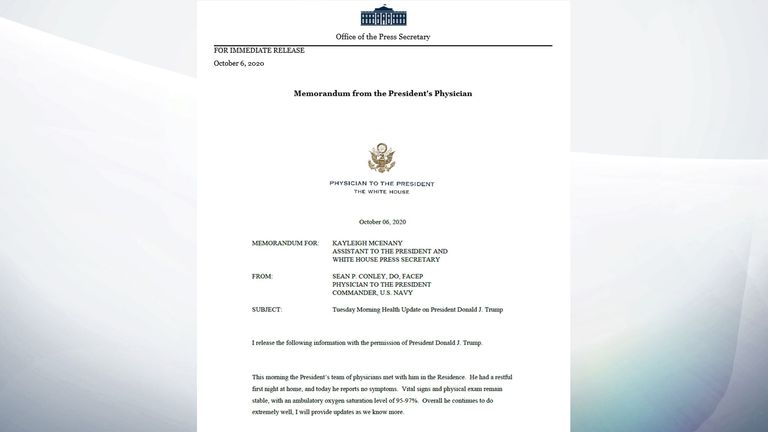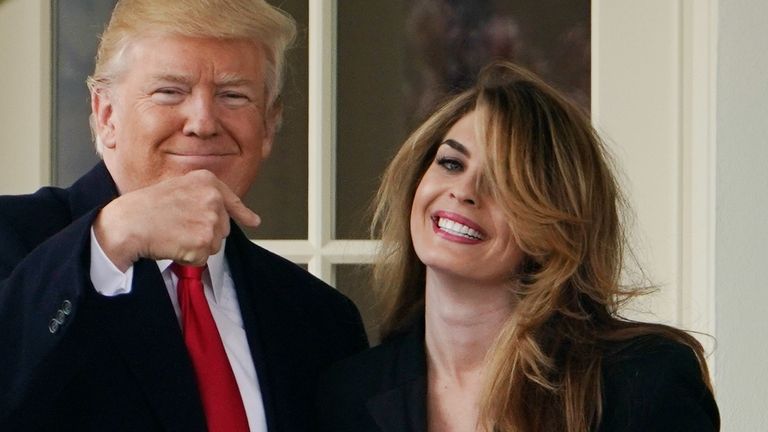Donald Trump has “had a restful first night at home” and has reported no symptoms of COVID-19 today, his White House doctor has said.
Dr Sean Conley said in a statement the president’s “vital signs and physical exam remain stable.
“Overall he continues to do extremely well,” Dr Conley said, adding that his oxygen saturation level, an indicator in treating the disease, is at 95-97%, in the normal range.
The illness has also affected US military top brass.
The Pentagon said on Tuesday US military service chiefs and other top military leaders were in quarantine after the US Coast Guard said its No. 2 official tested positive for COVID-19 over the weekend.
So far, there are at least 16 cases among White House staff and recent visitors to the complex, including press secretary Kayleigh McEnany and Hope Hicks, a counsellor to the president, the first staffer to test positive.
Vice President Mike Pence, however, is still unaffected.
Mr Pence “has remained healthy, without any COVID-19 symptoms,” and his daily tests for the illness have all been negative, White House physician, Dr Jesse Schonau said in a statement.
Several journalists covering the White House have also tested positive.
Mr Trump, who tweeted that he was “feeling really good!” on Monday, spent three nights in hospital at the Walter Reed Medical Centre.
Mr Trump – who is still infectious – appeared to be breathless upon his return to the White House.
He was diagnosed with COVID-19 on Thursday evening, a day after one of the president’s closest advisers, Ms Hicks, had displayed symptoms of the virus and later tested positive.
Mr Trump’s positive update on his own wellbeing may not be a good sign, a medical expert has warned.
Dr David Strain, Senior Clinical Lecturer at the University of Exeter, said it was “likely to be a side effect of the high dose dexamethasone”.
High dose corticosteroids, Dr Strain, who has treated COVID patients, said, “are well established to generate euphoria and insomnia.
“Paradoxically, however, they may also be associated with psychiatric reactions including profound mood swings, irritability and behavioural disturbance.”
Mr Trump’s doctors, he added, will be “carefully observing not only his physical health but also his mental wellbeing”, while he is taking them and for the period shortly afterwards as he “comes down”.
Shortly after his return, the US president released two videos, telling Americans to “get out there” and “don’t be afraid” of COVID-19 – despite the more than 210,000 coronavirus-related deaths recorded so far in the US.
“We’re going back to work, we’re going to be out front… I know there is a risk, there is a danger, but that’s ok,” he said.
And, with less than a month until the election on 3 November, he added that he was “looking forward” to the next presidential debate against his Democratic rival Joe Biden on 15 October in Miami.
Ms McEnany said on Tuesday the rise in COVID-19 cases at the White House is not disrupting the functioning of the administration, even as US media reported two more members of the administration have tested positive for the disease.
One of Mr Trump’s valets, an active member of the US military who travelled with the president last week, is one of them, Bloomberg News said on Twitter, quoting anonymous sources.
NBC, Bloomberg and CNN also reported that a military aide to the president has COVID-19.




